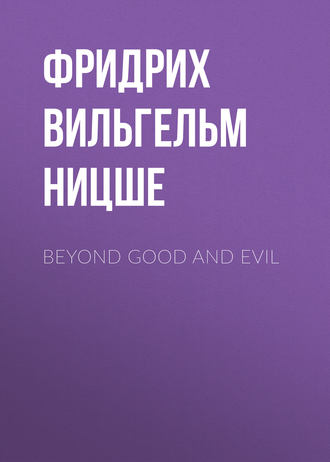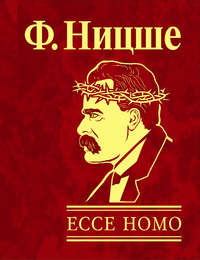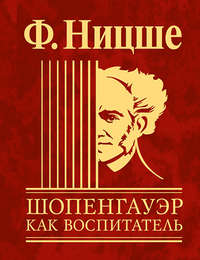 полная версия
полная версияBeyond Good and Evil
52. In the Jewish "Old Testament," the book of divine justice, there are men, things, and sayings on such an immense scale, that Greek and Indian literature has nothing to compare with it. One stands with fear and reverence before those stupendous remains of what man was formerly, and one has sad thoughts about old Asia and its little out-pushed peninsula Europe, which would like, by all means, to figure before Asia as the "Progress of Mankind." To be sure, he who is himself only a slender, tame house-animal, and knows only the wants of a house-animal (like our cultured people of today, including the Christians of "cultured" Christianity), need neither be amazed nor even sad amid those ruins – the taste for the Old Testament is a touchstone with respect to "great" and "small": perhaps he will find that the New Testament, the book of grace, still appeals more to his heart (there is much of the odour of the genuine, tender, stupid beadsman and petty soul in it). To have bound up this New Testament (a kind of ROCOCO of taste in every respect) along with the Old Testament into one book, as the "Bible," as "The Book in Itself," is perhaps the greatest audacity and "sin against the Spirit" which literary Europe has upon its conscience.
53. Why Atheism nowadays? "The father" in God is thoroughly refuted; equally so "the judge," "the rewarder." Also his "free will": he does not hear – and even if he did, he would not know how to help. The worst is that he seems incapable of communicating himself clearly; is he uncertain? – This is what I have made out (by questioning and listening at a variety of conversations) to be the cause of the decline of European theism; it appears to me that though the religious instinct is in vigorous growth, – it rejects the theistic satisfaction with profound distrust.
54. What does all modern philosophy mainly do? Since Descartes – and indeed more in defiance of him than on the basis of his procedure – an ATTENTAT has been made on the part of all philosophers on the old conception of the soul, under the guise of a criticism of the subject and predicate conception – that is to say, an ATTENTAT on the fundamental presupposition of Christian doctrine. Modern philosophy, as epistemological skepticism, is secretly or openly ANTI-CHRISTIAN, although (for keener ears, be it said) by no means anti-religious. Formerly, in effect, one believed in "the soul" as one believed in grammar and the grammatical subject: one said, "I" is the condition, "think" is the predicate and is conditioned – to think is an activity for which one MUST suppose a subject as cause. The attempt was then made, with marvelous tenacity and subtlety, to see if one could not get out of this net, – to see if the opposite was not perhaps true: "think" the condition, and "I" the conditioned; "I," therefore, only a synthesis which has been MADE by thinking itself. KANT really wished to prove that, starting from the subject, the subject could not be proved – nor the object either: the possibility of an APPARENT EXISTENCE of the subject, and therefore of "the soul," may not always have been strange to him, – the thought which once had an immense power on earth as the Vedanta philosophy.
55. There is a great ladder of religious cruelty, with many rounds; but three of these are the most important. Once on a time men sacrificed human beings to their God, and perhaps just those they loved the best – to this category belong the firstling sacrifices of all primitive religions, and also the sacrifice of the Emperor Tiberius in the Mithra-Grotto on the Island of Capri, that most terrible of all Roman anachronisms. Then, during the moral epoch of mankind, they sacrificed to their God the strongest instincts they possessed, their "nature"; THIS festal joy shines in the cruel glances of ascetics and "anti-natural" fanatics. Finally, what still remained to be sacrificed? Was it not necessary in the end for men to sacrifice everything comforting, holy, healing, all hope, all faith in hidden harmonies, in future blessedness and justice? Was it not necessary to sacrifice God himself, and out of cruelty to themselves to worship stone, stupidity, gravity, fate, nothingness? To sacrifice God for nothingness – this paradoxical mystery of the ultimate cruelty has been reserved for the rising generation; we all know something thereof already.
56. Whoever, like myself, prompted by some enigmatical desire, has long endeavoured to go to the bottom of the question of pessimism and free it from the half-Christian, half-German narrowness and stupidity in which it has finally presented itself to this century, namely, in the form of Schopenhauer's philosophy; whoever, with an Asiatic and super-Asiatic eye, has actually looked inside, and into the most world-renouncing of all possible modes of thought – beyond good and evil, and no longer like Buddha and Schopenhauer, under the dominion and delusion of morality, – whoever has done this, has perhaps just thereby, without really desiring it, opened his eyes to behold the opposite ideal: the ideal of the most world-approving, exuberant, and vivacious man, who has not only learnt to compromise and arrange with that which was and is, but wishes to have it again AS IT WAS AND IS, for all eternity, insatiably calling out da capo, not only to himself, but to the whole piece and play; and not only the play, but actually to him who requires the play – and makes it necessary; because he always requires himself anew – and makes himself necessary. – What? And this would not be – circulus vitiosus deus?
57. The distance, and as it were the space around man, grows with the strength of his intellectual vision and insight: his world becomes profounder; new stars, new enigmas, and notions are ever coming into view. Perhaps everything on which the intellectual eye has exercised its acuteness and profundity has just been an occasion for its exercise, something of a game, something for children and childish minds. Perhaps the most solemn conceptions that have caused the most fighting and suffering, the conceptions "God" and "sin," will one day seem to us of no more importance than a child's plaything or a child's pain seems to an old man; – and perhaps another plaything and another pain will then be necessary once more for "the old man" – always childish enough, an eternal child!
58. Has it been observed to what extent outward idleness, or semi-idleness, is necessary to a real religious life (alike for its favourite microscopic labour of self-examination, and for its soft placidity called "prayer," the state of perpetual readiness for the "coming of God"), I mean the idleness with a good conscience, the idleness of olden times and of blood, to which the aristocratic sentiment that work is DISHONOURING – that it vulgarizes body and soul – is not quite unfamiliar? And that consequently the modern, noisy, time-engrossing, conceited, foolishly proud laboriousness educates and prepares for "unbelief" more than anything else? Among these, for instance, who are at present living apart from religion in Germany, I find "free-thinkers" of diversified species and origin, but above all a majority of those in whom laboriousness from generation to generation has dissolved the religious instincts; so that they no longer know what purpose religions serve, and only note their existence in the world with a kind of dull astonishment. They feel themselves already fully occupied, these good people, be it by their business or by their pleasures, not to mention the "Fatherland," and the newspapers, and their "family duties"; it seems that they have no time whatever left for religion; and above all, it is not obvious to them whether it is a question of a new business or a new pleasure – for it is impossible, they say to themselves, that people should go to church merely to spoil their tempers. They are by no means enemies of religious customs; should certain circumstances, State affairs perhaps, require their participation in such customs, they do what is required, as so many things are done – with a patient and unassuming seriousness, and without much curiosity or discomfort; – they live too much apart and outside to feel even the necessity for a FOR or AGAINST in such matters. Among those indifferent persons may be reckoned nowadays the majority of German Protestants of the middle classes, especially in the great laborious centres of trade and commerce; also the majority of laborious scholars, and the entire University personnel (with the exception of the theologians, whose existence and possibility there always gives psychologists new and more subtle puzzles to solve). On the part of pious, or merely church-going people, there is seldom any idea of HOW MUCH good-will, one might say arbitrary will, is now necessary for a German scholar to take the problem of religion seriously; his whole profession (and as I have said, his whole workmanlike laboriousness, to which he is compelled by his modern conscience) inclines him to a lofty and almost charitable serenity as regards religion, with which is occasionally mingled a slight disdain for the "uncleanliness" of spirit which he takes for granted wherever any one still professes to belong to the Church. It is only with the help of history (NOT through his own personal experience, therefore) that the scholar succeeds in bringing himself to a respectful seriousness, and to a certain timid deference in presence of religions; but even when his sentiments have reached the stage of gratitude towards them, he has not personally advanced one step nearer to that which still maintains itself as Church or as piety; perhaps even the contrary. The practical indifference to religious matters in the midst of which he has been born and brought up, usually sublimates itself in his case into circumspection and cleanliness, which shuns contact with religious men and things; and it may be just the depth of his tolerance and humanity which prompts him to avoid the delicate trouble which tolerance itself brings with it. – Every age has its own divine type of naivete, for the discovery of which other ages may envy it: and how much naivete – adorable, childlike, and boundlessly foolish naivete is involved in this belief of the scholar in his superiority, in the good conscience of his tolerance, in the unsuspecting, simple certainty with which his instinct treats the religious man as a lower and less valuable type, beyond, before, and ABOVE which he himself has developed – he, the little arrogant dwarf and mob-man, the sedulously alert, head-and-hand drudge of "ideas," of "modern ideas"!
59. Whoever has seen deeply into the world has doubtless divined what wisdom there is in the fact that men are superficial. It is their preservative instinct which teaches them to be flighty, lightsome, and false. Here and there one finds a passionate and exaggerated adoration of "pure forms" in philosophers as well as in artists: it is not to be doubted that whoever has NEED of the cult of the superficial to that extent, has at one time or another made an unlucky dive BENEATH it. Perhaps there is even an order of rank with respect to those burnt children, the born artists who find the enjoyment of life only in trying to FALSIFY its image (as if taking wearisome revenge on it), one might guess to what degree life has disgusted them, by the extent to which they wish to see its image falsified, attenuated, ultrified, and deified, – one might reckon the homines religiosi among the artists, as their HIGHEST rank. It is the profound, suspicious fear of an incurable pessimism which compels whole centuries to fasten their teeth into a religious interpretation of existence: the fear of the instinct which divines that truth might be attained TOO soon, before man has become strong enough, hard enough, artist enough… Piety, the "Life in God," regarded in this light, would appear as the most elaborate and ultimate product of the FEAR of truth, as artist-adoration and artist-intoxication in presence of the most logical of all falsifications, as the will to the inversion of truth, to untruth at any price. Perhaps there has hitherto been no more effective means of beautifying man than piety, by means of it man can become so artful, so superficial, so iridescent, and so good, that his appearance no longer offends.
60. To love mankind FOR GOD'S SAKE – this has so far been the noblest and remotest sentiment to which mankind has attained. That love to mankind, without any redeeming intention in the background, is only an ADDITIONAL folly and brutishness, that the inclination to this love has first to get its proportion, its delicacy, its gram of salt and sprinkling of ambergris from a higher inclination – whoever first perceived and "experienced" this, however his tongue may have stammered as it attempted to express such a delicate matter, let him for all time be holy and respected, as the man who has so far flown highest and gone astray in the finest fashion!
61. The philosopher, as WE free spirits understand him – as the man of the greatest responsibility, who has the conscience for the general development of mankind, – will use religion for his disciplining and educating work, just as he will use the contemporary political and economic conditions. The selecting and disciplining influence – destructive, as well as creative and fashioning – which can be exercised by means of religion is manifold and varied, according to the sort of people placed under its spell and protection. For those who are strong and independent, destined and trained to command, in whom the judgment and skill of a ruling race is incorporated, religion is an additional means for overcoming resistance in the exercise of authority – as a bond which binds rulers and subjects in common, betraying and surrendering to the former the conscience of the latter, their inmost heart, which would fain escape obedience. And in the case of the unique natures of noble origin, if by virtue of superior spirituality they should incline to a more retired and contemplative life, reserving to themselves only the more refined forms of government (over chosen disciples or members of an order), religion itself may be used as a means for obtaining peace from the noise and trouble of managing GROSSER affairs, and for securing immunity from the UNAVOIDABLE filth of all political agitation. The Brahmins, for instance, understood this fact. With the help of a religious organization, they secured to themselves the power of nominating kings for the people, while their sentiments prompted them to keep apart and outside, as men with a higher and super-regal mission. At the same time religion gives inducement and opportunity to some of the subjects to qualify themselves for future ruling and commanding the slowly ascending ranks and classes, in which, through fortunate marriage customs, volitional power and delight in self-control are on the increase. To them religion offers sufficient incentives and temptations to aspire to higher intellectuality, and to experience the sentiments of authoritative self-control, of silence, and of solitude. Asceticism and Puritanism are almost indispensable means of educating and ennobling a race which seeks to rise above its hereditary baseness and work itself upwards to future supremacy. And finally, to ordinary men, to the majority of the people, who exist for service and general utility, and are only so far entitled to exist, religion gives invaluable contentedness with their lot and condition, peace of heart, ennoblement of obedience, additional social happiness and sympathy, with something of transfiguration and embellishment, something of justification of all the commonplaceness, all the meanness, all the semi-animal poverty of their souls. Religion, together with the religious significance of life, sheds sunshine over such perpetually harassed men, and makes even their own aspect endurable to them, it operates upon them as the Epicurean philosophy usually operates upon sufferers of a higher order, in a refreshing and refining manner, almost TURNING suffering TO ACCOUNT, and in the end even hallowing and vindicating it. There is perhaps nothing so admirable in Christianity and Buddhism as their art of teaching even the lowest to elevate themselves by piety to a seemingly higher order of things, and thereby to retain their satisfaction with the actual world in which they find it difficult enough to live – this very difficulty being necessary.
62. To be sure – to make also the bad counter-reckoning against such religions, and to bring to light their secret dangers – the cost is always excessive and terrible when religions do NOT operate as an educational and disciplinary medium in the hands of the philosopher, but rule voluntarily and PARAMOUNTLY, when they wish to be the final end, and not a means along with other means. Among men, as among all other animals, there is a surplus of defective, diseased, degenerating, infirm, and necessarily suffering individuals; the successful cases, among men also, are always the exception; and in view of the fact that man is THE ANIMAL NOT YET PROPERLY ADAPTED TO HIS ENVIRONMENT, the rare exception. But worse still. The higher the type a man represents, the greater is the improbability that he will SUCCEED; the accidental, the law of irrationality in the general constitution of mankind, manifests itself most terribly in its destructive effect on the higher orders of men, the conditions of whose lives are delicate, diverse, and difficult to determine. What, then, is the attitude of the two greatest religions above-mentioned to the SURPLUS of failures in life? They endeavour to preserve and keep alive whatever can be preserved; in fact, as the religions FOR SUFFERERS, they take the part of these upon principle; they are always in favour of those who suffer from life as from a disease, and they would fain treat every other experience of life as false and impossible. However highly we may esteem this indulgent and preservative care (inasmuch as in applying to others, it has applied, and applies also to the highest and usually the most suffering type of man), the hitherto PARAMOUNT religions – to give a general appreciation of them – are among the principal causes which have kept the type of "man" upon a lower level – they have preserved too much THAT WHICH SHOULD HAVE PERISHED. One has to thank them for invaluable services; and who is sufficiently rich in gratitude not to feel poor at the contemplation of all that the "spiritual men" of Christianity have done for Europe hitherto! But when they had given comfort to the sufferers, courage to the oppressed and despairing, a staff and support to the helpless, and when they had allured from society into convents and spiritual penitentiaries the broken-hearted and distracted: what else had they to do in order to work systematically in that fashion, and with a good conscience, for the preservation of all the sick and suffering, which means, in deed and in truth, to work for the DETERIORATION OF THE EUROPEAN RACE? To REVERSE all estimates of value – THAT is what they had to do! And to shatter the strong, to spoil great hopes, to cast suspicion on the delight in beauty, to break down everything autonomous, manly, conquering, and imperious – all instincts which are natural to the highest and most successful type of "man" – into uncertainty, distress of conscience, and self-destruction; forsooth, to invert all love of the earthly and of supremacy over the earth, into hatred of the earth and earthly things – THAT is the task the Church imposed on itself, and was obliged to impose, until, according to its standard of value, "unworldliness," "unsensuousness," and "higher man" fused into one sentiment. If one could observe the strangely painful, equally coarse and refined comedy of European Christianity with the derisive and impartial eye of an Epicurean god, I should think one would never cease marvelling and laughing; does it not actually seem that some single will has ruled over Europe for eighteen centuries in order to make a SUBLIME ABORTION of man? He, however, who, with opposite requirements (no longer Epicurean) and with some divine hammer in his hand, could approach this almost voluntary degeneration and stunting of mankind, as exemplified in the European Christian (Pascal, for instance), would he not have to cry aloud with rage, pity, and horror: "Oh, you bunglers, presumptuous pitiful bunglers, what have you done! Was that a work for your hands? How you have hacked and botched my finest stone! What have you presumed to do!" – I should say that Christianity has hitherto been the most portentous of presumptions. Men, not great enough, nor hard enough, to be entitled as artists to take part in fashioning MAN; men, not sufficiently strong and far-sighted to ALLOW, with sublime self-constraint, the obvious law of the thousandfold failures and perishings to prevail; men, not sufficiently noble to see the radically different grades of rank and intervals of rank that separate man from man: – SUCH men, with their "equality before God," have hitherto swayed the destiny of Europe; until at last a dwarfed, almost ludicrous species has been produced, a gregarious animal, something obliging, sickly, mediocre, the European of the present day.
CHAPTER IV. APOPHTHEGMS AND INTERLUDES
63. He who is a thorough teacher takes things seriously – and even himself – only in relation to his pupils.
64. "Knowledge for its own sake" – that is the last snare laid by morality: we are thereby completely entangled in morals once more.
65. The charm of knowledge would be small, were it not so much shame has to be overcome on the way to it.
65A. We are most dishonourable towards our God: he is not PERMITTED to sin.
66. The tendency of a person to allow himself to be degraded, robbed, deceived, and exploited might be the diffidence of a God among men.
67. Love to one only is a barbarity, for it is exercised at the expense of all others. Love to God also!
68. "I did that," says my memory. "I could not have done that," says my pride, and remains inexorable. Eventually – the memory yields.
69. One has regarded life carelessly, if one has failed to see the hand that – kills with leniency.
70. If a man has character, he has also his typical experience, which always recurs.
71. THE SAGE AS ASTRONOMER. – So long as thou feelest the stars as an "above thee," thou lackest the eye of the discerning one.
72. It is not the strength, but the duration of great sentiments that makes great men.
73. He who attains his ideal, precisely thereby surpasses it.
73A. Many a peacock hides his tail from every eye – and calls it his pride.
74. A man of genius is unbearable, unless he possess at least two things besides: gratitude and purity.
75. The degree and nature of a man's sensuality extends to the highest altitudes of his spirit.
76. Under peaceful conditions the militant man attacks himself.
77. With his principles a man seeks either to dominate, or justify, or honour, or reproach, or conceal his habits: two men with the same principles probably seek fundamentally different ends therewith.
78. He who despises himself, nevertheless esteems himself thereby, as a despiser.
79. A soul which knows that it is loved, but does not itself love, betrays its sediment: its dregs come up.
80. A thing that is explained ceases to concern us – What did the God mean who gave the advice, "Know thyself!" Did it perhaps imply "Cease to be concerned about thyself! become objective!" – And Socrates? – And the "scientific man"?
81. It is terrible to die of thirst at sea. Is it necessary that you should so salt your truth that it will no longer – quench thirst?
82. "Sympathy for all" – would be harshness and tyranny for THEE, my good neighbour.
83. INSTINCT – When the house is on fire one forgets even the dinner – Yes, but one recovers it from among the ashes.
84. Woman learns how to hate in proportion as she – forgets how to charm.
85. The same emotions are in man and woman, but in different TEMPO, on that account man and woman never cease to misunderstand each other.
86. In the background of all their personal vanity, women themselves have still their impersonal scorn – for "woman".
87. FETTERED HEART, FREE SPIRIT – When one firmly fetters one's heart and keeps it prisoner, one can allow one's spirit many liberties: I said this once before But people do not believe it when I say so, unless they know it already.
88. One begins to distrust very clever persons when they become embarrassed.
89. Dreadful experiences raise the question whether he who experiences them is not something dreadful also.











